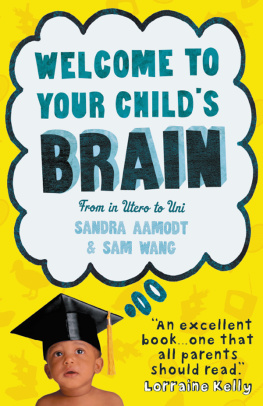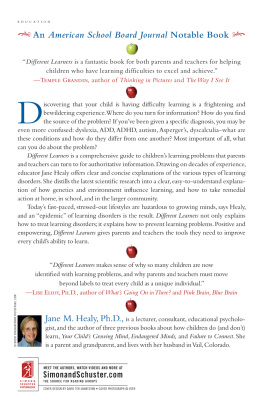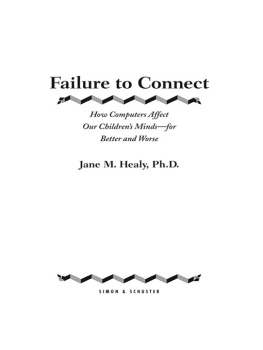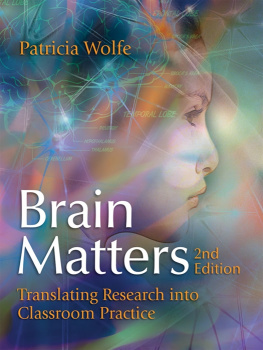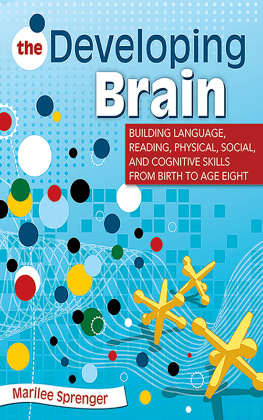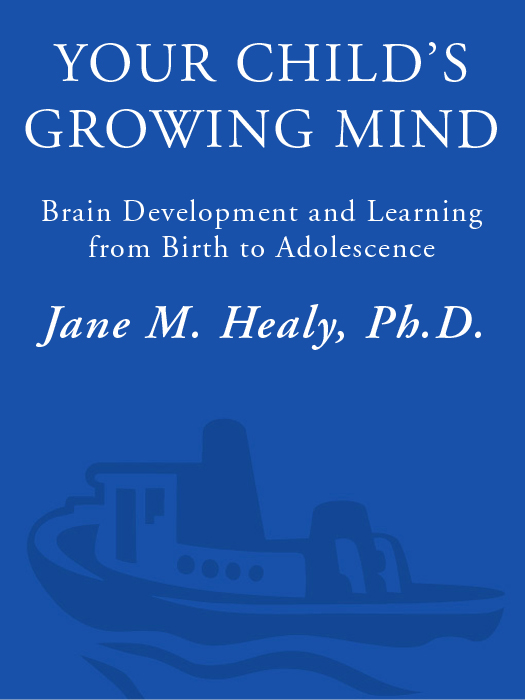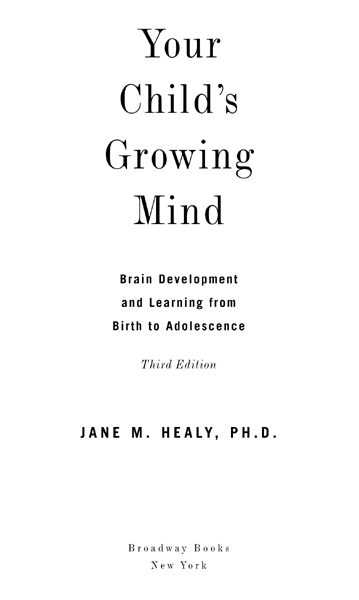
YOUR CHILDS GROWING MIND. Copyright 1987, 1994, 2004 by Jane M. Healey. All rights reserved. No part of this book may be reproduced or transmitted in any form or by any means, electronic or mechanical, including photocopying, recording, or by any information storage and retrieval system, without written permission from the publisher. For information, address Broadway Books, a division of Random House, Inc., 1745 Broadway, New York, NY 10019.
BROADWAY BOOKS and its logo, a letter B bisected on the diagonal, are trademarks of Random House, Inc.
Visit our website at www.broadwaybooks.com
First edition published 1987
Library of Congress Cataloging-in-Publication Data
Healy, Jane M.
Your childs growing mind: brain development and learning from birth to adolescence / Jane Healey.3rd ed.
p. cm.
1. Learning, Psychology of. 2. Child rearing. 3. Educational psychology. 4. Pediatric neuropsychology. I. Title.
BF3 18.H4 2004
155.413dc22
2003062558
eISBN: 978-0-307-78894-8
v3.1
Praise for Your Childs Growing Mind
How do our children learn to read? What can we do to encourage creativity or to help develop math skills? How do we know if our child has a learning problem? From infancy to adolescence, Jane Healy offers us a blueprint for understanding our children. Never condescending and always sympathetic to what is asked of parents, Dr. Healy gives concrete, clear-cut suggestions on what to do and leaves us with an understanding of the ways our childrens brains work.
Kathy Heinzelman,
The Parents League of New York
Dr. Healy has done it again with Your Childs Growing Mind. Nobody makes child development and its practical applications so clear and readable. A must for parents.
Michael Brody, M.D., American Academy of Child and Adolescent Psychiatry
Your Childs Growing Mind is an essential book for all parents and educators. Healy offers an impressive selection of scientific brain research and articulates with clarity and passion its relevance to child development and learning. Replete with research-based ideas, recommendations, and resources for parents and educators, this book is a powerful guide for raising developmentally healthy children and adolescents.
James P. Comer, M.D., Maurice Falk
Professor of Child Psychiatry, Yale Child
Study Center, and Associate Dean, Yale
School of Medicine
Jane Healys work has long enjoyed the respect of those who believe that the developmental needs of children are the first responsibility of educators. With the latest edition of Your Childs Growing Mind, she makes it abundantly clear that a childs mind is not an immature or outmoded computer, but an integral component of a dynamic, motivated, and rapidly changing organism. In making her case as clearly as she does, she secures her reputation as a constructive contrarian in the current debate about the role of technology in early childhood education.
Frank R. Wilson, M.D., Clinical Professor of Neurology, Stanford University School of Medicine
Kudos to Jane Healy on the third edition of her seminal book Your Childs Growing Mind. No one writes about the development of the childs brain as succinctly and practically as Healy. This book belongs on the shelf of every parent. I wish it had been available when my own children were young!
Patricia Wolfe, author of Brain Matters:
Translating Research to Classroom Practice
Also by Jane M. Healy:
Endangered Minds: Why Our Children Dont
Think and What We Can Do About It
Failure to Connect: How Computers Affect Our
Childrens Minds and What We Can Do About It
This book is dedicated to all the
parents and teachers who said,
Thats very interesting, but what
should we do about it?
Acknowledgments

As Your Childs Growing Mind enters its third edition, I am drawn to reflect back to 1987, as I waited anxiously for the publics response to this, my first literary child. The immediate outpouring of acceptance from both parents and educators both astonished and gratified me, and I remain increasingly grateful to all those who continue to support the book and tell me stories about how it has helped them. So, thanks first to all the dedicated parents and teachers who regularly confirm my faith that most adults truly care about kids and want to learn more about how to educate them in positive and appropriate ways.
I am boundlessly grateful to the innumerable colleagues who have contributed to the books success and my continuing education over the years. A lot of wonderful people working in this field have taught and encouraged me, and provided important wake-up calls to keep the message on target. Many have taken the time to answer questionsand forced me to ask new ones.
During these years of teaching and lecturing around the world, my greatest reward has been in human terms: new friends everywhere, parents from all walks of life who have said, Thank you for helping me trust my own judgment, and teachers who told me that bringing the brain to school made a differencefor them and for their students. Now, adult former students also reassure me that brain-appropriate teaching methods really do make a difference. Every week parents and children provide the real impetus for my work by bringing to life the implications of the research.
For this third edition, I again thank my agent, Angela Miller, for continuing to nudge my motivation and organize its fruition. Trish Medved, my editor, energized the project even while producing another growing mind by becoming a new mom while the manuscript was being completed! Beth Datlowe was invariably responsive and helpful. The staff at the Vail Public Library once more proved an invaluable resource. I remain grateful to friends for putting up with the vagaries of a writer in process and not rhapsodizing too much about the ski runs or hikes they took while I sat at the word processor.
My family, always supportive, now includes a new generation. My most loving thanks to Nicholas, Katherine, Andrew, Nathaniel, Emma, and Sarah Jane for delighting, amusing, reenergizing, and keeping their grandmother up to date with the stages, needs, and joys of childhood. My children, who agreeably consented to appear in the book when it was first written, are now invaluable as informants on the challenges of parenthood in the twenty-first century. Mano Mac, my mother, who was so proud of the book, is no longer with us, but her spirit is on every page.
I am superfortunate as well to have Tom, my husband of forty-six years, who is my steady bulwark, sounding board, soul mate, and the best friend I could ever have.
Thank you all.
Contents

Part One
Brain Development and Learning
Part Two
Foundations of Learning


